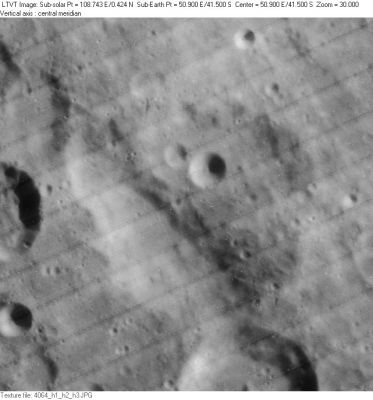Young
Contents
Young
|
Lat: 41.5°S, Long: 50.9°E, Diam: 71 km, Depth: 2 km, Rükl: 68 |
Images
LPOD Photo Gallery Lunar Orbiter Images Apollo Images
Maps
(LAC zone 114C1) LAC map Geologic map
Description
Description: Wikipedia
Additional Information
- Data from Kurt Fisher crater depths
- Westfall, 2000: 2 km
- Cherrington, 1969: 4.29 km
Greenish coloration at crater Young?
"A number of observers have claimed in the past that the inner slopes of the formation Young have a greenish, almost translucent cast or sheen when seen at the evening terminator" (Harold Hill, pages 234, 235, 236; see also: Vallis Rheita) - DannyCaes Mar 24, 2009
Nomenclature
- Named for Thomas Young (June 13, 1773-May 10, 1829), an English polymath, contributing to optics, physiology, and Egyptology, among other fields. In physics, Young is perhaps best known for his double-slit experiment, did much to establish the wave theory of light, and as the discoverer of the interference of light.
- Young was Catalog Number 4446 in Mary Blagg's Collated List, where the present name is attributed to Julius Schmidt. The feature had been called Rheita g in Neison, 1876, and was unnamed in Beer and Mädler. Young entered the IAU nomenclature in Named Lunar Formations (1935).
LPOD Articles
Bibliography
Appearances of the name Young in the Sourcebook Project (William R. Corliss)
- In Mysterious Universe, a handbook of astronomical anomalies (1979) :
- Page 4: The Corona (the author; a certain C. A. Young, The Sun, 1896).
- Page 114: The Radial Markings of Venus and their Modern Resurrection (James C. Bartlett, Strolling Astronomer, 1955). Just Young.
- Page 131: Super-Rotating Atmosphere of Venus (Harry E. Hunt, Nature, 1977). Just Young.
- Page 135: Venus Breathes in Steady Fashion (New Scientist, 1973). A certain J. W. Young.
And... also a certain R. K. Young (of the Dominion Astrophysical Observatory, Victoria, B. C.) :
- Page 672: Einstein Displacement on the Plates Taken by the Canadian Party at the Australian Eclipse (C.A.Chant, Science, 1923).
